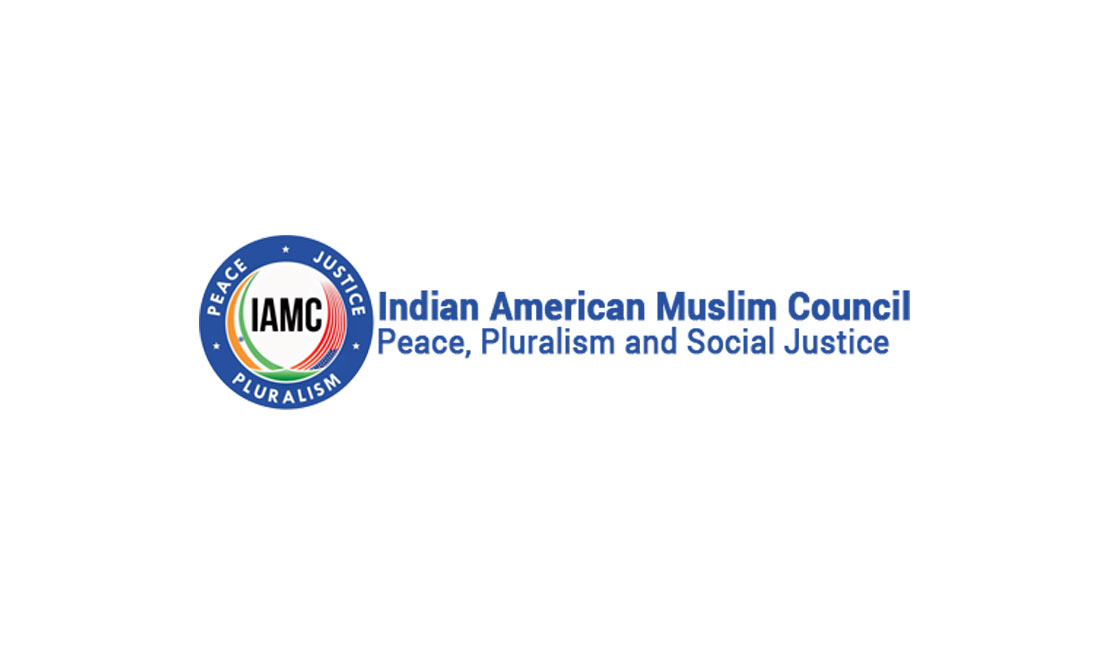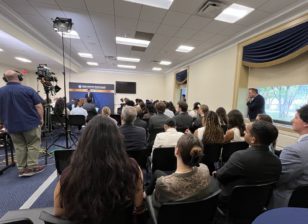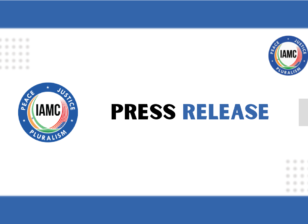Indian Muslim Council’s First National Convention a Huge Success
Santa Clara, CA, June 30th, 2003: The first annual convention of the Indian Muslim Council-USA held on June 28th 2003 in Santa Clara, CA, was a huge success. Speakers and delegates called this a first of its kind symposium on India and a landmark event.
Over 25 speakers representing a diverse and impressive array of experts, journalists, academicians and prominent representatives of secular as well as all major Indian religious communities held groundbreaking discussions on important contemporary issues relating to regional instability, human rights, sectarian violence, militant nationalism and prospects of boosting social amity in India. The convention, held at the Santa Clara Marriott, was attended by over 500 people.
Human Rights update
Smita Narula, India expert and senior researcher at Human Rights Watch, previewed an advance copy of HRW report on India titled “Compounding Injustice” at the convention. The report highlights the continued breakdown of government and judicial machinery in the Indian state of Gujarat, which witnessed one of the most gruesome anti-minority violence in the history of Independent India. Govind Acharya, India Director at Amnesty International highlighted the plight of the religious minorities in Gujarat and suggested actions to bring relief and justice to the victims.
Experiences in Multi-culturalism
The session titled “Experiences in Multi-culturalism” hosted a panel of speakers representing all major religious communities of India and was a major attraction. Raju Rajagopal, President of Coalition Against Communalism, elaborated on the distinction between Hindutva and Hinduism.
Reverend Jaswant Singha highlighted the plight of the Indian Christians and expressed solidarity with the Muslim victims of the Gujarat pogrom. Kulmeet Singh, National Coordinator of the Sikh Coalition, addressed the issue of the persecution of Sikhs in India and labeled attempts by the Sangh Parivar to address Sikhs as Hindus as a “policy of destruction through assimilation”.
Dr. Aslam Abdallah, editor of the Muslim Observer and Minaret pondered on the issue of Muslim extremism while Dr. Ahmedullah Siddiqui, Professor of Public Relations at Western Illinois University, focused on fresh approaches that the Indian Muslim community can take in improving its outreach relations.
Dr. K. P. Singh, convener of the International Association of the Advancement of Dalit people explained Gujarat pogrom in the context of the 2000 years of persecution of Dalits. Dr. Rahul Deepankar, International President, Indian Buddhist Association of America spoke of the “dalitization of Muslims.”
John Prabhudoss, executive director of the Policy Institute for Religion & State, a Washington DC based think tank, spoke about the need for joint efforts to counter the growing influence of the Hindu extremists on the Capitol Hill and establishment of a framework of cooperation among secular & plural minded groups.
Shri Shrikumar Poddar, of the Vaishnava Center for Enlightenment, who was unable to attend the convention due to a prior commitment in Germany send a letter of support stating “I am wholeheartedly with you in the success of our mission”.
Contributions Acknowledged
Awards, named after great Muslim Indians were presented in various categories. The award for “Best indepth coverage of the Indian Diaspora, was awarded to Rukmini Callimachi of the Daily Herald of Illinois for her series on the Indian Diaspora living in suburban Chicago.
The Banquet Address
Father Cedric Prakash, the Director of PRASHANT, the Jesuit Center of Human Rights, Justice and Peace in the State of Gujarat, spokesperson forewarned the people not to develop amnesia about the Gujarat pogrom and detailed the ongoing persecution of the Muslims and Christians in Gujarat. Referring to the words of India’s first Prime Minister Pandit Nehru who fifty-four years ago in an address to the US Congress very forthrightly said ” when freedom is threatened or justice is menaced, India cannot and shall not be neutral”. Fr. Prakash said, “Yes, my dear friends, in the fact of what happened in Gujarat a year ago, none of us can be neutral. We have to take the stand for what is right and for what is just. He presented a replica of the “tree of life motif” of the famous Sidi Saiyed mosque to IMC-USA. The BJP led government had removed this century long symbol of Gujarat.
Praful Bidwai, one of the most respected and widely read journalist and political commentator in India, presented a detailed analysis of the political and economic strategy of the Hindutva group and called the battle for the soul of India as “not over yet”. He predicted that Hindutva attempts to destroy India’s secular democracy will fail. He backed his prediction with the fact that an overwhelming majority of India’s national newspapers lamented the BJP’s electoral victory in Gujarat and that no national or regional political party supports BJP’s political or religious ideology.
Dr. Shaik Ubaid, president of IMC-USA, reassured Fr. Prakash that IMC-USA will never forget the Gujarat pogrom and will continue to work to bring all religious and secular groups together to promote pluralism in India. He pointed out that many moderate Hindu leaders have been in the forefront of the struggle against Hindutva-fascism. He warned that by remaining silent on the activities of Hindutva extremists, the Indian Diaspora in the US will hurt the future empowerment of its coming generations. He called resisting the spread of Hindutva-extremism in India and the US, “the highest patriotic duty”, as the extremists are not only damaging the reputation of India but are causing immense damage to India’s economy.
Jameel Johnson, Chief of Staff of Congressman Gregory Meeks (D-NY 6th) addressed the overflowing banquet session on the importance of guarding the civil rights vigilantly while Congressman Mike Honda of Santa Clara (D-CA 15th) congratulated the Indian Muslim Council-USA for its holding of the inter-faith convention.
Gujarat & its Aftermath
Earlier in the day Nishrin Hussain, the daughter of Ehsan Jafri, the slain member of parliament of India, spoke about how women and children were specifically targeted by the perpetrators of The Gujarat pogrom. The same session also discussed the suffering of the Kashmiri Hindus and Muslims.
The afternoon sessions were addressed by an impressive array of academic experts, such as Dr. Lise Mckean, Dr. Angana Chatterji and Dr. Hari Sharma. Imam Khalid Griggs, the African American Muslim leader congratulated the Indian Muslims on forming their own organization but advised them to work with others and for all social justice issues.
Exhibition
The convention also featured an exhibition of photographs, posters and news articles. It covered all aspects of Gujarat carnage, including the Godhra massacre. One half of the exhibition was completely devoted to highlight the acts of courage, compassion, humanity and love in midst of all the carnage. There were pictures and news articles that depicted the acts of communal harmony: Hindus, Christians and other people of different religious denominations saving Muslim lives, protecting their properties and sheltering them from the marauding mobs at the risk of their own lives. The exhibition also highlighted the efforts of various organizations both here in the US and in India in tackling the rising menace of sectarianism.
Participation of organizations
A number of organizations espousing pluralism, tolerance and progressive development participated in the convention at various levels. The list of participating organizations included Alliance of South Asians Taking Action (ASATA), Association of India’s Development (AID), ASHA-Stanford, Coalition Against Communalism (CAC), Council on American Islamic Relations (CAIR-CA), EKTA, Indian Muslim Relief Committee (IMRC), ICNA, The Sikh Coalition, Policy Institute for Religion & State (PIFRAS), Vaishnava Center for Enlightenment and Voice of Asia among others.
Protests! And Praise!
About half a dozen protestors who claimed to be belonging to Hindu Unity, a group with extreme views that recently celebrated the birthday of Gandhi’s assassin, denounced the ongoing discussion on pluralism and criticized Human Rights Watch and Amnesty International.
The speakers and delegates were unanimous in calling the first IMC-USA convention a great success. The IMC-USA leadership was unanimous in attributing the tireless work of its Bay area team of volunteers as the factor behind the convention’s success.
For More information Contact:
Indian Muslim Council-USA
2088 Walsh Ave.
Santa Clara-CA, 95050
Tel#: 408-219-1433 or 516-567-0783
E-mail:info@imc-usa.org



